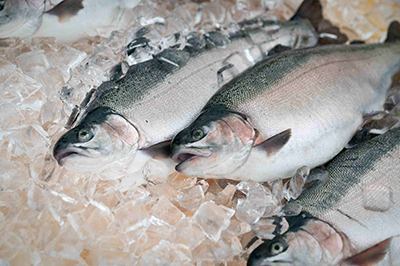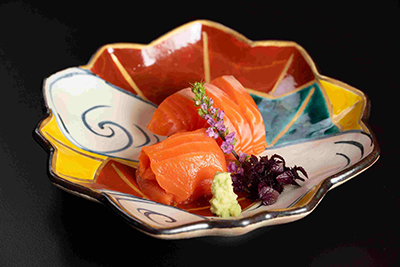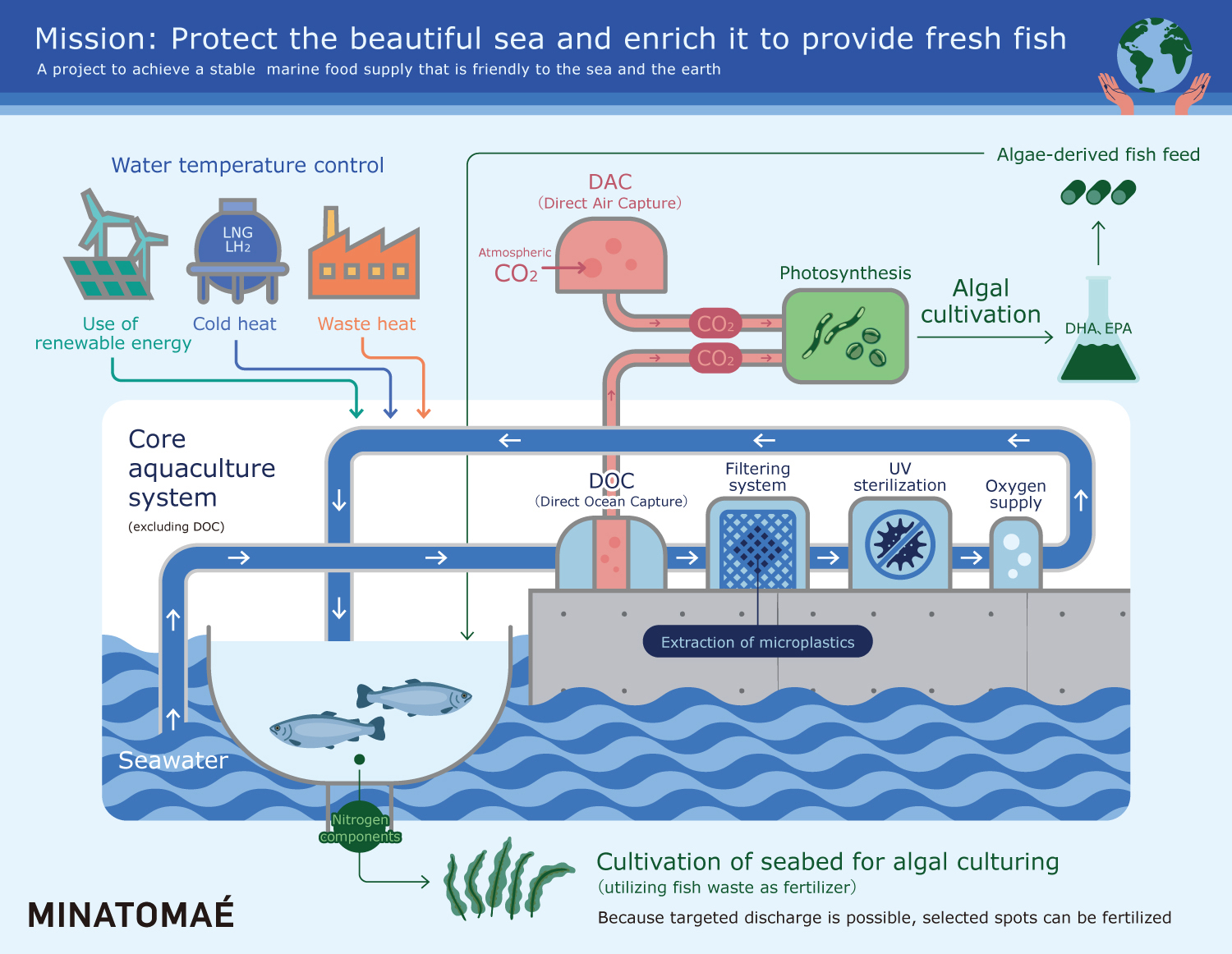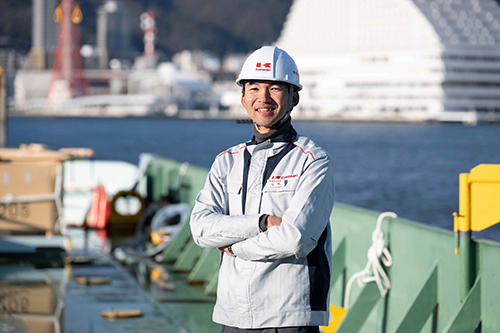Kawasaki Harvests Cultured Fish in the Sea near Kobe Port Using Its Aquaculture Technologies, Achieving One of Japan’s Highest-Density Fish Farms in a Closed Containment Environment
Apr. 24, 2025
 |
 |
|
| Cultured trout salmon taken out of the pen | Sashimi from the trout salmon |
Tokyo, 24 April, 2025 — Kawasaki Heavy Industries, Ltd. announced today that it has successfully harvested 850 fish grown by Kawasaki’s aquaculture system developed under the MINATOMAE Project (literally, “right-by-the-port” project), which was launched with the aim of contributing to improving food security. The harvested fish are trout salmon (rainbow trout cultured in seawater) weighing 2 kg each on average, which were cultured in a test farm in the sea near the Port of Kobe (by Kawasaki’s Kobe Works) in preparation for the commercialization of this aquaculture system.
The test farming began in January 2025 using a 30-m3 closed pen with a farming density of 60 kg (of fish)/m3, which is four times higher than conventional marine aquaculture systems and one of the highest in the country (according to Kawasaki’s research). The test farming also demonstrated favorable growth and clean-looking fish without the use of chemicals. The accomplishment of harvesting high-quality trout salmon should lead to sustainable fish farming in the sea near urban areas.
Kawasaki’s closed containment aquaculture system was developed using the company’s proprietary technologies for filtering, sterilizing, and other water treatments used for industrial plants, as well as fluid control technologies for developing marine vessels, marine machinery, and railcars. This prevents viruses and parasites from entering the aquaculture farms, performs 24/7 monitoring of water properties and other farming conditions, and optimizes aquafeeds, supply of oxygen, and water circulation inside the pen.
The MINATOMAE Project—Kawasaki-Developed Sustainable Aquaculture Technology for Reinforced Food Security
As the global population grows (expected to reach 10 billion by 2050), demand for protein will also surge, making protein deficiency more common. Other factors, such as climate change, are aggravating the situation. In Japan, these already-negative factors are coupled with a low food self-sufficiency rate (lower than other developed nations), labor shortages in the primary industries, geopolitical risks, depletion of marine resources, logistics challenges, and rising distribution costs. It is therefore a matter of urgency to transform Japan’s agriculture and fisheries into sustainable growth industries in order to secure food for the population*.
*The Prime Minister’s Office of Japan (May 17, 2023). Food Security Reinforcement Policy Framework (Revised)
https://www.kantei.go.jp/jp/singi/nousui/pdf/20231227honbun.pdf (Japanese)
To provide solutions to these challenges, Kawasaki launched a project in 2021 to develop aquaculture technology that is sustainable, has a small environmental footprint, and is robust against external factors such as red tides (harmful algal blooms) and water temperature changes. The MINATOMAE Project aims to utilize the sea near ports and coasts (close to consumers and distribution centers) that have not been used previously for aquaculture. Through this project, Kawasaki aims to present the potential for aquaculture business in these areas, thereby contributing to solving the future food-related challenges facing humanity.

Partnering with Maruha Nichiro for Farming and Distribution
In this project, farming of fish and distribution were assisted by a leading fishery company, Maruha Nicihro Corporation (headquartered in Koto City, Tokyo; President & CEO Masaru Ikemi). In 2022, Kawasaki partnered with the company to develop relevant technologies at the company’s aquaculture site. After completing four demonstration tests, Kawasaki launched full-scale testing in the sea by the Kobe Works. Despite the test farm being located where many vessels passed by that agitated the water at times — a condition highly unsuitable for conventional fish farms — Kawasaki was able to create a farming environment friendly to the fish, and successfully grew the fish in the area near the port. This was made possible by Maruha Nichiro’s extensive knowledge of the behavior of cultured fish, together with Kawasaki’s expertise in computational fluid dynamics (CFD) analysis, water treatment, sloshing dynamics, and other technologies.
Moving forward, Kawasaki aspires to create new business models for aquaculture, capitalizing on its engineering capabilities and technological prowess, coupled with Maruha Nichiro’s fish farming expertise, sales/distribution channels, and close connections with fishery-related associations and entities.

Project Manager, Food Security Solution Project
Business Development Department
Technology Innovation Center
Corporate Technology Division
Kawasaki Heavy Industries, Ltd.
Project Manager’s Comment
“After launching the test farm in January 2025, on April 24 we were able to harvest large trout salmon. Following the announcement of our aquaculture system on April 14, 2025**, we received much more feedback than we expected. I was happy to learn of the favorable response and at the same time realized how high the interest was in the MINATOMAE Project. Based on the experience gained from the tests conducted in the proximity of an urban area, and through the technological synergy achieved from working with our business partners, we hope to expand the potential for aquaculture.”
**Kawasaki Heavy Industries, Ltd. (April 14, 2025). Kawasaki Develops Sustainable Aquaculture System Focused on Reinforcing Food Security — Tests Being Conducted to Achieve Safe, Secure, and Tasty Marine Products.
https://global.kawasaki.com/en/corp/newsroom/news/detail/?f=20250414_3033
For more than 120 years, since its incorporation in 1896, the Kawasaki Heavy Industries Group has been providing value to society in various ways based on its state-of-the-art, advanced technologies used for manufacturing products that encompass the land, sea, and air sectors. In 2020, we set “Trustworthy Solutions for the Future” as our vision to be achieved by 2030 (Group Vision 2030), with three focused fields: “A safe and secure remotely-connected society,” “near-future mobility,” and “energy and environmental solutions,” in order to achieve a sustainable society. Centered around this newly-developed aquaculture system, we are committed to establishing and providing a business model that allows for year-round fish farming, thereby contributing to a safe and secure society for everyone, backed by robust food security, and conserving the earth’s environment, especially the marine environment.
Contact
If you need more information about our business,
please feel free to contact us.





